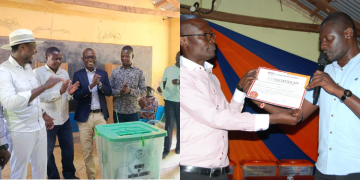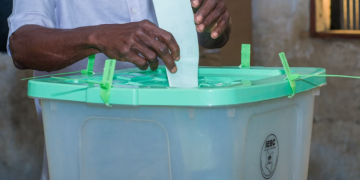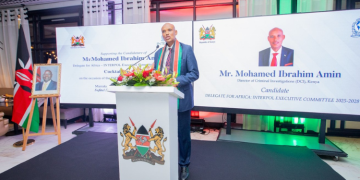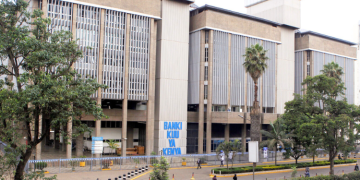Gazing into the face of adversity and emerging resilient, these often-overlooked heroes are guiding Kenya toward a future free from trachoma. The dedicated community health promoters whose tireless efforts are improving lives are working in remote areas raising awareness about trachoma and distributing antibiotics, effectively bridging the gap between healthcare services and the communities that need them most.
By fostering trust and engagement, they ensure increased access to critical healthcare resources regardless of socioeconomic status.
Local champions and stakeholders advocate alongside health promoters for improved access to treatment and prevention services, contributing to the elimination of trachoma in Kenya.
Trachoma has plagued humanity for the longest time and remains one of the leading causes of preventable blindness globally.
It presents a significant public health challenge in Kenya, affecting an estimated 7 million people across 12 endemic counties.
Despite ongoing interventions, approximately 53,000 individuals have been blinded by the disease, underscoring the urgent need for sustained efforts to address this critical issue.

Trachoma prevalence
Trachoma is prevalent in areas with water shortages, poor sanitation, and fly infestation. It is caused by repeated infection with the chlamydia trachomatis bacteria, and spreads through contact with infected flies, and physical transmission via hands, clothes, or bedding (in contact with infected persons).
It can lead to severe eye pain, scarring, and blindness. Trachoma continues to create social isolation, and economic hardship due to increased healthcare costs and leading to reduced productivity.
Also Read: Glaucoma: Eye Disease That Causes Blindness Without Warning
However, Kenyans are getting closer to saying goodbye to this neglected tropical disease for good, through the transformative work of local community health promoters and champions.
The WASH (Water, Sanitation, and Hygiene) Program supported by the Children’s Investment Fund Foundation (CIFF), implemented in partnership with the Kenyan Health Ministry and Sightsavers, is improving access to clean water and sanitation, essential for preventing the spread of trachoma.
Supporting community awareness campaigns to inform residents about the disease, its transmission, and prevention methods, thereby reducing stigma and encouraging treatment.
Moreover, there is widespread capacity building for community health promoters under this project, providing them with training and resources to enhance their effectiveness in delivering care and education.
Through collaboration among local organizations, there is a coordinated approach to trachoma elimination, leveraging existing community structures for greater impact.
Community health systems established for one disease can be effectively repurposed to tackle others, as evidenced by various initiatives in East Africa.
Community Health Promoters Expanded roles
In Kenya, trained community health promoters (CHPs) who initially focused on trachoma have successfully expanded their roles to include the distribution of essential medications for other neglected tropical diseases (NTDs) like lymphatic filariasis.
Similarly, in Ethiopia, community health volunteers have been mobilized to support not only trachoma interventions but also outreach for deworming campaigns and maternal health services.
While Uganda demonstrates a similar trend, where CHPs are involved in both maternal and child health services and the management of NTDs, enhancing community trust and health outcomes.
This multi-disease approach maximizes the use of human resources and strengthens community engagement and trust, as programs that previously mobilized promoters for malaria prevention have integrated trachoma interventions, demonstrating how lessons from one health challenge can inform strategies for another.
Also Read: Against All Odds: How a Visually Impaired Journalist is Changing the Game [VIDEO]
The experience gained in monitoring and tracking progress for trachoma has laid the groundwork for implementing similar data collection systems for diseases like schistosomiasis.
By harnessing these community systems, countries can enhance health outcomes across multiple disease areas while ensuring that no one is left behind.
Local community groups, such as (Community Health Promoters CHPs) and Women’s Health Advocacy Groups, play a crucial role in spreading awareness and education about trachoma prevention.
They mobilize members to engage in health education campaigns, promote hygiene practices, and facilitate access to treatment.
Women are a critical component in the path towards elimination as they are almost twice as likely to go blind from the disease than men.
Power of Collaboration
Organizations like the World Health Organization (WHO) provide essential guidelines and support to help Kenya develop effective strategies for trachoma elimination and bolstering the efforts of local communities and health promoters on the ground.
In Kenya, communities and health promoters play a vital role in implementing these SAFE strategies. They conduct door-to-door outreach, educating families about the importance of facial cleanliness and proper sanitation to prevent trachoma transmission.
These promoters also facilitate the distribution of antibiotics and organize surgical interventions for those affected by advanced stages of the disease.
Their involvement extends to monitoring and reporting health data, which is crucial for adapting strategies to local needs.
Moreover, community health promoters help create a supportive environment for hygiene practices, often working with schools to promote handwashing and cleanliness among children.
These collective efforts, collaboration, and commitment are making a significant impact in the fight against trachoma. Together, they are paving the way for a healthier future for all Kenyans, ensuring Kenya is on track to meet the World Health Organization’s goal of eliminating trachoma by 2030.
In the faces of those affected by trachoma, we see not just statistics but stories of resilience and hope. Everyone represents a life interrupted by illness, yet through the tireless work of dedicated health promoters and community members, they are given a chance to reclaim their sight and their future. These heroes remind us that change is possible, that compassion can bridge the gaps of despair, and that together, we can transform lives.
About the Author
Titus Watitu, Preventative Chemotherapy Manager, Ministry of Health – Kenya.
Titus Watitu is a skilled parasitologist and entomologist with extensive experience in coordinating and implementing control and elimination activities for PC-NTDs (Preventive Chemotherapy Neglected Tropical Diseases). Currently, he serves as the preventive chemotherapy manager at the Vector Borne and Neglected Tropical Diseases Unit within the Ministry of Health, Kenya.
In his role, Titus provides strategic advice to the NTD program manager on effective interventions to support the Kenya Trachoma Elimination Program and broader PC-NTD initiatives. As a subject matter expert in NTDs, he plays a critical role in developing and overseeing operational surveys and research focused on monitoring, evaluating, and advancing control measures for PC-NTDs.
Titus collaborates closely with colleagues at the Ministry of Health, contributing his expertise in vector-borne diseases and NTDs across various areas, from policy and guideline development to implementation research and program development.
Follow our WhatsApp Channel and join our WhatsApp Group for real-time news updates.









































































